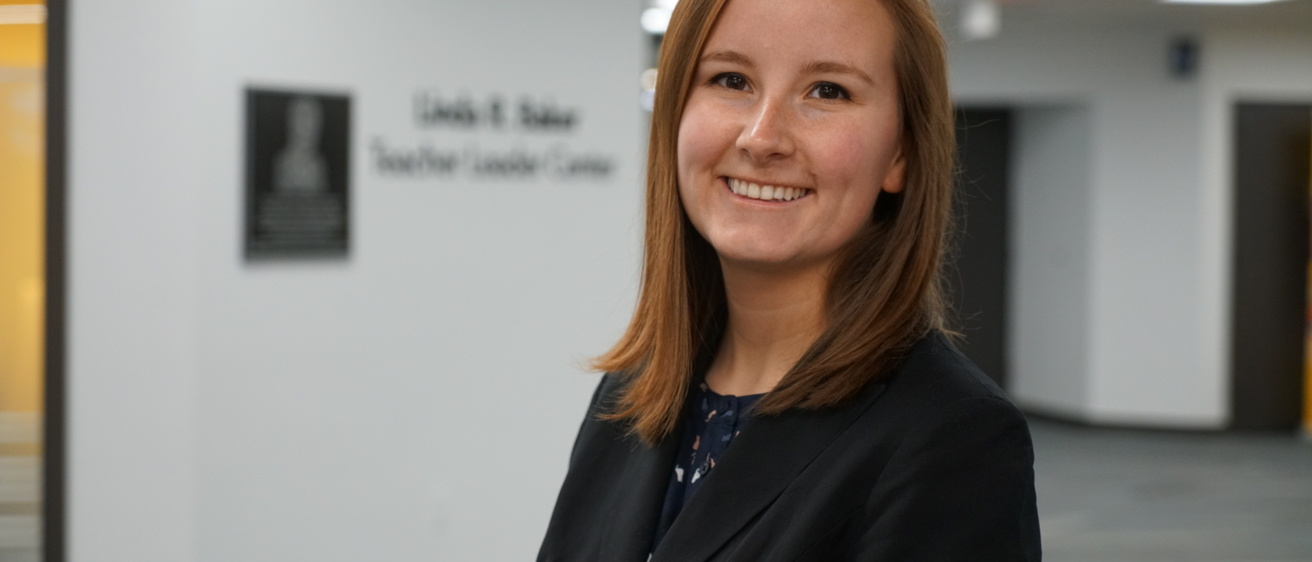Chelsea Keenan
Christina Crowley’s biggest lesson she learned while at the University of Iowa? Why building relationships is so important.
As an undergraduate, she played the trombone in the Hawkeye Marching Band. There she learned how important it was to find your place and to be part of something bigger than yourself. While in the College of Education, she learned how the support of a professor or classmate could help her.
And as a student teacher at Iowa City West High School, she learned how to really listen to her students and be a sympathetic ear rather than the person with all of the answers.
“At this moment, I’m surrounded by so many wonderful people,” she says. “I’d love to – in the vein of (Associate Dean for Teacher Education) Nancy Langguth or anyone that has bottled wisdom – I just want to give them a few last words that in a dark day of teaching they can fall back on.”
Crowley, who will graduate with an MAT in English Education this May, will be the student speaker for the May 2018 College of Education Commencement. She is one of 84 students who have completed the Teacher Education Program to be recommended to the Iowa Board of Educational Examiners for teacher licensure. The commencement ceremony will take place on Thursday, May 10, at 4 p.m. in Hancher Auditorium.
“No one is excited to go to an 8:30 am foundations of education lecture, but you find your people in there who have important conversations, and you walk away having learned something,” she says.
The Carlisle, Iowa native will start as an English teacher at Winterset High School in south central Iowa this fall. She always knew she wanted her career to revolve around English, she says, but she just didn’t necessarily know how.
“I remember the first time I read ‘Les Miserables,’ – my whole world changed,” she recalls. “I learned so many things about the human experience, you know, this was a seventh-grade revelation, but I just felt so many things because of this book in my hand. It was just me and that book. That was a big moment for me as a reader.”
As an undergraduate, she studied both English and French, originally thinking she’d become a college professor. She ultimately decided that research and the pressure to publish in academic journals wasn’t for her. But she discovered that working with students and being in a classroom was a perfect fit.
“English classes always helped foster conversations that were about the things that mattered and the things I wanted to talk about,” she says. “Conversations about the state of the world, inequalities, and not only historical time periods – but the people and stories that come out of those time periods.”
English class gives students an avenue to talk about hard and complicated topics, she adds.
“It’s a lens that makes it safe for people to get some hard opinions out there,” she says. “It’s easier to talk about issues of race after you read ‘To Kill a Mockingbird.’”
She loves helping students connect with four-hundred-year-old texts like Shakespeare’s Macbeth, she says, and seeing the insights they have.
“It all boils down to the relationships you build – whether that’s in a classroom, with your coworkers, fellow education students, or professors,” she says. “This life is just built on how we connect to others and how we’re able to connect even if they’re very different from us.
“I think we’re going to face that a lot in the classroom. If we can just see the humanity in other people and try to connect with them – we have to use education as a vehicle to teach the next generation how to connect and find commonalities rather than tear someone down.”
